|
|
|
Sort Order |
|
|
|
Items / Page
|
|
|
|
|
|
|
| Srl | Item |
| 1 |
ID:
133536
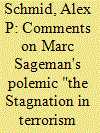

|
|
|
|
|
| Publication |
2014.
|
| Summary/Abstract |
Marc Sageman's lamenting about the "Stagnation in Terrorism Research" stands in stark contradiction to my conclusion in the Routledge Handbook of Terrorism Research (2011) that "Terrorism Studies-despite many shortcomings-has matured" and that "Terrorism Studies has never been in better shape than now." 1 While I agree with much else of what Marc Sageman says, there are a few points I disagree with. To begin with the notion of "stagnation": Terrorism Studies began, with few exceptions (Crozier, 1960; Thornton, 1964; Walter, 1964, 1969; Gaucher, 1965), 2 in the 1970s. Yet there had never been a period of real bloom in the 20th century-something which logically should precede the alleged stagnation after 9/11. As Andrew Silke noted in 2006:
|
|
|
|
|
|
|
|
|
|
|
|
|
|
|
|
| 2 |
ID:
133535


|
|
|
|
|
| Publication |
2014.
|
| Summary/Abstract |
Have you heard the story about the Englishman lost in an Irish mist trying to find the route to Limerick? He reaches a country crossroads, and asks an old man for directions; after much thought the old man's answer is, "If I were you I wouldn't start from here." From Sageman's account, you might in many ways infer that's the story of much contemporary terrorism research, and is, it seems to me, the unstated fundamental assumption behind his paper-if we had the freedom to start from scratch, if we were designing an area of study to investigate how violence is used to do things to influence political decision making, we'd probably want to conduct ourselves in a different way than we have. But we are where we are. Whether we like it or not, in studying terrorism and the terrorist, we engage with a world in which governments, officials, and politicians largely define the agenda (and keep changing it), set the rules for risk tolerance, and to a large extent control the money and through the choices they make direct research agendas.
|
|
|
|
|
|
|
|
|
|
|
|
|
|
|
|
| 3 |
ID:
133540
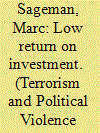

|
|
|
|
|
| Publication |
2014.
|
| Summary/Abstract |
First, I would like to thank David Rapoport for making this exchange possible. It is an important aspect of scholarly debate that has been missing from terrorism research. I also wish to thank the authors of the comments on my article on the stagnation on some part of terrorism research. I appreciate their kind words about my past work. Such praise coming from colleagues I truly esteem, and from whom I've learned so much, means a lot to me. However, I would also like to correct their impression about my mood. Far from being gloomy or pessimistic, I took to survey the area of terrorism research in order to see where we are and what we should do as a collegium. What should we do to improve terrorism research? Let me address each of the commentators in the order I read them.
|
|
|
|
|
|
|
|
|
|
|
|
|
|
|
|
| 4 |
ID:
133537


|
|
|
|
|
| Publication |
2014.
|
| Summary/Abstract |
Anyone who cares about both the national security threat arising from transnational al Qaeda-inspired terrorism and the need to develop a measured, effective response to this threat owes a great deal of gratitude to Marc Sageman. He was an early teller of inconvenient truths. As he notes in his essay, the tumultuous years following 9/11 were marked by the rise and mass dissemination of wild, ahistorical, and anecdote-based theories about the causes and possible solutions to violence motivated by the virulent ideology propagated by Sayyid Qutb in the 1950s and tragically brought to our shores by Osama bin Laden. Sageman insisted, however, that theory must be supported by evidence. He presented the facts as he saw them without regard to those he was undercutting on each side of the political spectrum. Over a decade after 9/11, his work has withstood the test of time and had a significant positive impact on our understanding of why al Qaeda attacked us and our policies for confronting this threat.
|
|
|
|
|
|
|
|
|
|
|
|
|
|
|
|
| 5 |
ID:
133539


|
|
|
|
|
| Publication |
2014.
|
| Summary/Abstract |
Dr. Sageman makes a good point that despite the influx of government funding in the last decade, terrorism scholars have not been able to answer what he calls a "simple question"-what leads a person to turn to political violence? But Dr. Sageman's conclusion that scholars' inability to answer this question is evidence of stagnation in the field is incorrect. First, most scholars who study terrorism are addressing risk factors for terrorism at the level of societies, not individuals, so it is hardly surprising that there is no "consensus answer" to Dr. Sageman's question. Second, the question Dr. Sageman poses about individual level decision-making is not at all simple to assess. It is difficult to make gross generalizations about what leads individuals to do what they do in any area of life; difficulty in answering this question is not unique to terrorism experts. Consider analogous questions about individual decision-making with regard to other life choices. Despite significantly more than a decade of study, neither scientists nor humanists have been able to explain, ex ante, what leads a person to fall in love, to murder another, or to choose a particular career path (as a terrorist, or otherwise). A detailed study of an individual's life history might enable scholars to propose ex post hypotheses as to why that individual chose a career as a terrorism expert rather than as a terrorist, but even then, experts from varying disciplines (including psychiatry) would focus on different parts of the problem, seen through different lenses. It is not clear why Dr. Sageman holds terrorism scholarship to a standard that no other group of scholars aiming to understand and predict human behavior has yet been able to achieve.
|
|
|
|
|
|
|
|
|
|
|
|
|
|
|
|
| 6 |
ID:
133538
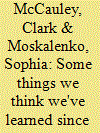

|
|
|
|
|
| Publication |
2014.
|
| Summary/Abstract |
It is a pleasure to have this opportunity to respond to a distinguished colleague's concerns about the progress of terrorism research since the 9/11 attacks. Marc Sageman sees little progress and identifies numerous impediments to research, notably including lack of good data and over-reliance on formal modeling
|
|
|
|
|
|
|
|
|
|
|
|
|
|
|
|
| 7 |
ID:
133534
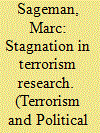

|
|
|
|
|
| Publication |
2014.
|
| Summary/Abstract |
Despite over a decade of government funding and thousands of newcomers to the field of terrorist research, we are no closer to answering the simple question of "What leads a person to turn to political violence?" The state of stagnation with respect to this issue is partly due to the government strategy of funding research without sharing the necessary primary source information with academia, which has created an unbridgeable gap between academia and the intelligence community. This has led to an explosion of speculations with little empirical grounding in academia, which has the methodological skills but lacks data for a major breakthrough. Most of the advances in the field have come from historical archival research and analysis of a few field interviews. Nor has the intelligence community been able to achieve any breakthrough because of the structure and dynamic of this community and its lack of methodological rigor. This prevents creative analysis of terrorism protected from political concerns. The solution to this stagnation is to make non-sensitive data available to academia and to structure more effective discourse between the academic and intelligence communities in order to benefit from the complementary strengths in these two communities.
|
|
|
|
|
|
|
|
|
|
|
|
|
|
|
|
| 8 |
ID:
188090
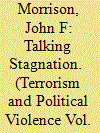

|
|
|
|
|
| Summary/Abstract |
In 2014, Marc Sageman proposed that terrorism research had stagnated. The claim of stagnation has resulted in a period of collective review within terrorism studies. To date, the fruits of this review have revealed a more cautiously optimistic view of the field than that proposed by Sageman. This article aims to add to this review by analyzing the interviews of forty-three guests from the first season of the Talking Terror podcast. Presented is a thematic analysis of their views on the overall health of terrorism research. The interviewees included both pre-and post-9/11 researchers. Through this analysis four themes are identified: Interdisciplinary Research and Researchers, Data, Applied Research, and Area/Field. The majority of interviewees were more optimistic than Sageman in relation to the overall health of the area. Analysis of their responses is presented alongside some recommendations for the future direction of the area.
|
|
|
|
|
|
|
|
|
|
|
|
|
|
|
|
|
|
|
|
|